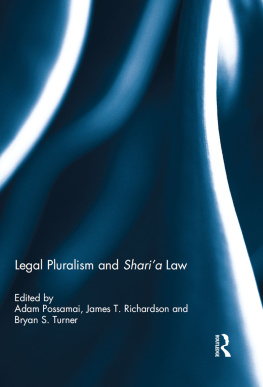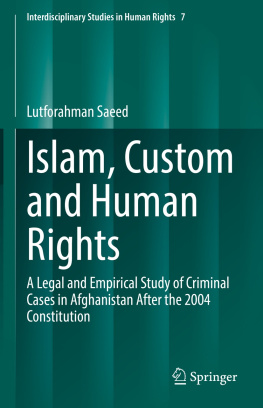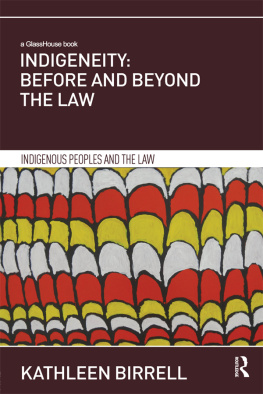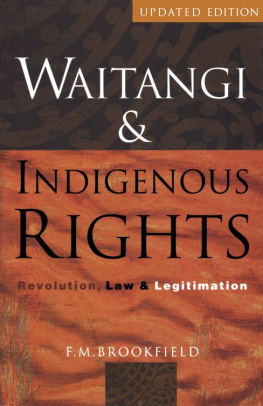First published in 2000 in Great Britain by
Routledge
2 Park Square, Milton Park, Abingdon, Oxon, OX14 4RN
270 Madison Ave, New York NY 10016
Transferred to Digital Printing 2009
Website: www.Routledge.com
Copyright 1999 Leon Sheleff
British Library Cataloguing in Publication Data
Sheleff, Leon
The future of tradition: customary law, common law and legal pluralism
1. Multiculturalism 2. Pluralism (Social sciences)
3. Indigenous peoples Legal status, laws, etc.
4. Indigenous peoples Politics and government I. Title
323.11
ISBN 0-7146-4953-8 (cloth)
Library of Congress Cataloging-in-Publication Data
Sheleff, Leon.
The future of tradition: customary law, common law, and legal pluralism / Leon Sheleff
p. cm.
Includes bibliographical references and index.
ISBN 0714649538 (cloth). ISBN 0714680125 (pbk.)
1. Customary law. 2. Indigenous peoples Legal status, laws, etc.
3. Indigenous peoples Social life and customs. 4. Legal
polycentricity. I. Title.
K282.S53 1999
340.5 dc21
All rights reserved. No part of this publication may be reproduced, stored in or introduced into a retrieval system or transmitted in any form or by any means, electronic, mechanical, photocopying, recording or otherwise, without the prior written permisson of the publisher of this book.
Publisher's Note
The publisher has gone to great lengths to ensure the quality of this reprint but points out that some imperfections in the original may be apparent.
Preface
The writing of this book has been an odyssey in more ways than one it has been a learning experience in the sense of trying to understand the culture of indigenous or tribal people in different parts of the world, and the political and social history of the countries in which they struggle to maintain their identity and dignity; it has entailed utilizing sabbatical leave to travel to different parts of the globe in an encounter with both new climes and old nostalgic memories; it has involved an intellectual challenge of collecting information and ideas, pondering over their meaning and significance, and formulating interpretations and appraisals; it has entailed exposure to fascinating written material and has facilitated stimulating contacts, some ongoing, some fleeting, with a wide range of people in diverse circumstances.
While true to the standards of academic research, it contains an underlying personal element of birth and initial education in a land then wracked by the tragedy of racism and apartheid, and now, as an outsider, of paying respect, indirectly through this work, to the people of this special, almost unique, rainbow nation, as they build their destiny anew, for it was long ago in South Africa that I first became aware of many of the issues that I have probed in this work. This book is also the fruition of earlier, more theoretical, endeavours involved in expressing different aspects of human rights and searching for a sociological perception of the role of law in society, in which customary law seems to provide a potential synthesis between what I have termed social cohesion and legal coercion of obligatory rules emanating upwards from the people and not imposed by external dictate.
During this journey over the past decade, I have benefited from fruitful discussions with many people, including students, to whom the facts and thesis have been presented in formal lectures and seminars. Amongst colleagues and friends who have listened and responded or helped and encouraged in various ways, I would like to mention in particular Tom Bennett, the late Gerald Gordon, Nancy Gordon, Sally Frankental, and the late Jack Simons (all of Cape Town), Louis Waller and Arie Frieberg (of Melbourne), Ian McDuff (of Wellington), Malcolm Feeley (of Berkeley), Riaz Hassan (of Adelaide), Gidon Kessel (of Beer-Sheva), and Natan Lerner, Chava Shachor-Landau and Moshe Shokeid (of Tel-Aviv). At the institutional level, my thanks go to the Law Faculty of Monash University, the Center for the Study of Law and Society at the University of California at Berkeley, the Department of Criminology at Melbourne University, and the Kaplan Centre for Jewish Studies at the University of Cape Town, all of which provided me with space and facilities, as well as a pleasant environment conducive to work.
Others who have been helpful, include Aviam Soifer, Allie Dubb, Peter Skalnik, the late Roberta Kevelson, Pamela Dutton, Robert Leslie, Paul Nkwi, and Justice Durie. I am also grateful for the opportunity that was provided me to present and test my ideas in seminar presentations and informal discussions at the Sociology Department at Flinders University, the Law Faculty at Waitaki University, the Sociology Department at the University of Papua New Guinea, and the Department of Anthropology at the University of Cape Town, as well as at the Institute of Oriental and Orissan Studies in Cuttack, India, where I made my initial foray into this area at a conference on Tribal Society in a Changing World, held in 1988. My thanks to members of these academic units for their helpful comments, as also to my research assistants, Tamar Goldschmidt-Arad and Merav Afek, for their diligence, to typists, Sylvia Weinberg, Roslyn Langbart and Beryl Baleson, for their efficient and pleasant assistance, and to sundry colleagues, librarians and administrative staff at Tel Aviv University for their continuous support and interest. The Israel Yearbook on Human Rights, edited by Yoram Dinstein, also published early articles on the topic, based on work presented at a symposium held at the Law Faculty.
I end with the hope that beyond its academic value, this book may also contribute to the welfare of those living in tribal communities, who are involved in a constant striving to retain and express the culture and customs that were carved out by earlier generations and bequeathed to them as living links in an endless chain and may help others to be more tolerant of their strivings, more understanding of the motivations spurring them on, and more respectful of the manifestations that emerge.
Finally, I dedicate this book to the members of my own extended family, spread out in four different continents, for their hospitality and encouragement during the years of research and writing.
Custom-Made Law
Social life is dependent on the capacity of people to create rules to guide them in their everyday activities. The rules themselves, in normal situations, will represent a common denominator of shared values and practices which may be enumerated in different ways within a comprehensive prior framework in the form of legislation, by retroactive announcement while dealing with a particular issue that requires solution in the form of adjudication, or by the general acknowledgment and acceptance of agreed and known norms of behavior.
The usual manner in which concrete expression is given to most rules is through a state with its legislative and judicial organs, and generally accepted means of according recognition to prevalent customary practices. However, there are also situations, in which rules of an obligatory or strongly persuasive nature are created without the formal procedures of parliament, courts, and other constituted bodies that characterize a state. In some countries, a certain degree of formality may attach to them, in others they may be mainly amorphous.









